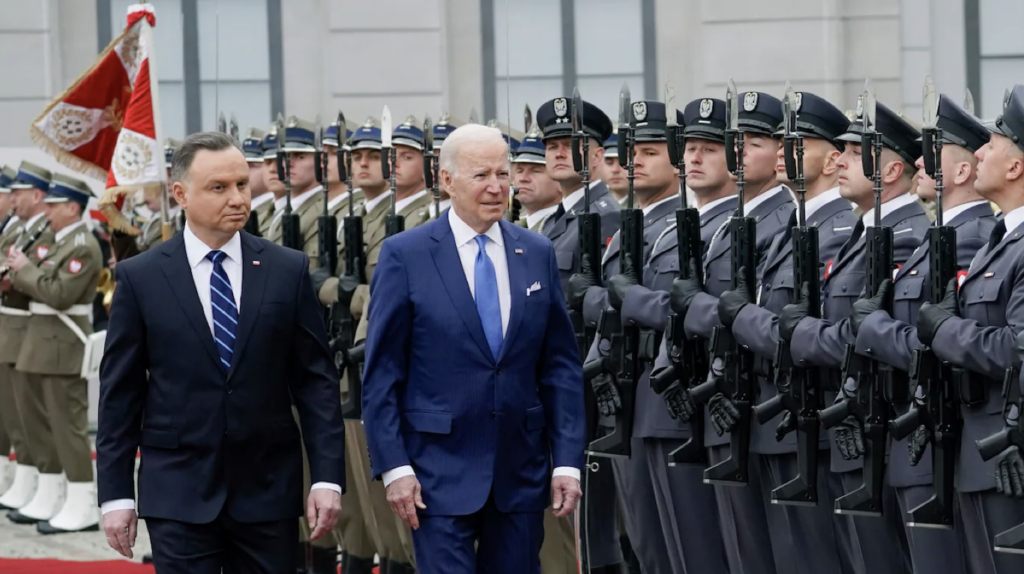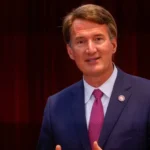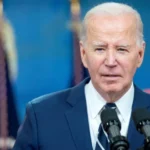
Published June 5, 2023
WARSAW — Poland’s staunch support of Ukraine and its key location in Eastern Europe make the nation one of the United States’ most important European allies. But given its fractious domestic politics, the United States should tread carefully as it deepens its relationship with the country.
I recently spent a week in Poland as part of a study tour sponsored by the Ministry of Foreign Affairs. The whirlwind itinerary included visits with Polish economic and foreign policy experts, tours of schools and facilities serving the roughly 1.5 million Ukrainian refugees in the country and a meeting with Prime Minister Mateusz Morawiecki. The trip helped develop a greater appreciation of the important role Poland will play in the United States’ relationship with Europe, but it also highlighted the challenges the partnership will pose.
Poland is a key part of any NATO strategy to contain Russian aggression. It is already the essential transit point for military aid to Ukraine, with which it shares a border. Without active Polish involvement, it would be almost impossible to keep the beleaguered nation out of the grasp of Russian President Vladimir Putin.
Poles’ support for Ukraine has not wavered, likely because many fear for their own freedom. Neighboring Belarus is already essentially a Russian vassal, allowing Putin to use its territory to carry out attacks and station tactical nuclear weapons. If Ukraine were to fall, Poland would have to defend hundreds of miles of border from an aggressive and far stronger adversary.
Many Poles also remember that from 1795 to the fall of the Soviet Union in 1991, except for a short-lived period between the two world wars, Russia ruled all or part of their country. Even that brief independence was made possible only by defeating a Russian invasion in 1920.
This helps explain why Morawiecki’s government has provided roughly 2.5 billion euros of military aid to Ukraine, more than any European country after Britain and Germany. In addition to the roughly 1.5 million Ukrainian refugees it has housed and integrated, it has facilitated the transit of millions more to other countries. And it is rapidly shoring up its defenses, increasing military spending to 4 percent of its gross domestic product this year and seeking to raise that to 5 percent.
Given all of this, why hasn’t Poland earned a place in America’s inner circle of allies? Because of the country’s sharply divided politics.
Poland is highly polarized. Its current government is led by Law and Justice, a populist conservative party that runs on familiar themes of nationalism, social conservatism and economic growth. Its opponents — especially those in the center-right Civic Platform coalition — have sharply criticized the country’s purported democratic backsliding, including what they charge are efforts to turn state television media into a government propaganda outlet and to undermine the rule of law by changing the judiciary. These concerns resulted in the European Union withholding certain funds from Poland, which the government is still trying to resolve.
Massive anti-government demonstrations this past weekend show this conflict is intensifying. More than 500,000 Poles rallied in Warsaw and other cities to protest a new law that would allow for the investigation of alleged Russian influence within Poland. Anyone found to be advancing Russian interests could be barred from political activity for up to a decade. Civic Platform leader Donald Tusk contends this could be used to silence or sideline legitimate opposition and move Poland closer to Hungary or Turkey. The European People’s Party, a center-right party in the European Parliament, echoed those sentiments in a tweet on Sunday, showing that the Polish divisions are seeping into the continent more broadly.
Elections this fall for Poland’s Parliament appear to be razor-close. Civic Platform’s coalition has allied with two others, The Left and Third Way, to put forward a slate for the less powerful Senate. Together, these parties consistently poll between about 48 and 52 percent, compared with the roughly 36 percent made up by Law and Justice and its allies. The balance is made up of an ultraconservative coalition, Confederation, which runs the gamut from monarchists to libertarians and ultranationalists, and a few smaller parties.
The side that loses will be furious, and it’s far from certain that the outcome will be universally respected. The Polish Supreme Court rejected efforts to overturn the 2020 presidential election results, handing Law and Justice President Andrzej Duda a narrow 51-49 win. If anything, passions now are higher now than they were then.
The United States cannot allow itself to become embroiled in this partisan warfare. President Biden must make clear that he intends to work with whichever coalition can form a government. That means he must steer clear of endorsing the opposition’s claims that the government is destroying Polish democracy. He must also avoid embracing the current government too strongly, even if it is essential to saving Ukraine.
Poland and the United States need each other. But that alliance must be based on shared national interests and rise above partisan politics on both sides of the Atlantic.
Henry Olsen is a Washington Post columnist, a senior fellow at the Ethics and Public Policy Center and the Thomas W. Smith distinguished scholar in residence at Arizona State University for the winter/spring 2023 semester.
Henry Olsen, a senior fellow at the Ethics and Public Policy Center, studies and provides commentary on American politics. His work focuses on how America’s political order is being upended by populist challenges, from the left and the right. He also studies populism’s impact in other democracies in the developed world.












